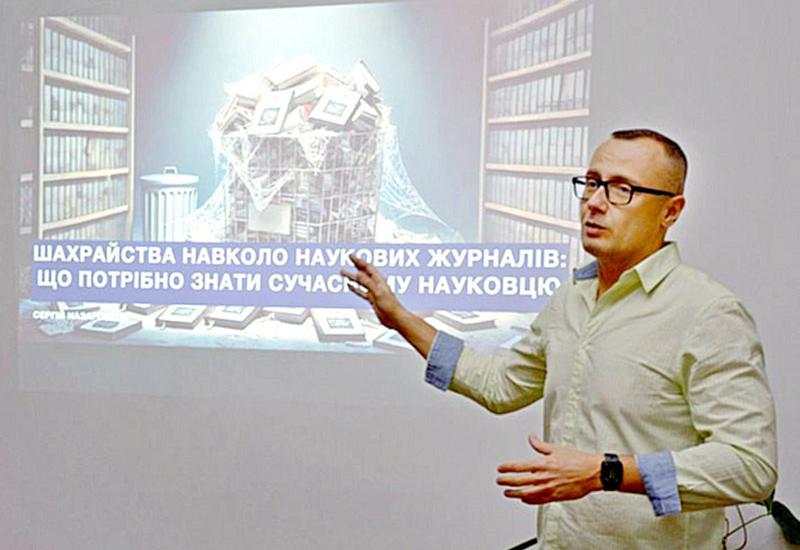On October 28, the Scientific and Technical Library of Igor Sikorsky Kyiv Polytechnic Institute hosted an open lecture on “Frauds around scientific journals, or How to protect your research”, delivered by PhD in Social Communications Serhii Nazarovets.
💥
This event brought together scholars, students, and all those who want to protect their research from the traps set by the editors of fraudulent journals and organizers of unethical academic practices. Such phenomena are becoming increasingly common in the modern scientific world. The lecturer aimed to help students navigate the intricacies of choosing scientific journals and recognize the signs of “predatory” journals that actively attract authors with promises of quick publication, but instead harm both researchers and the scientific community as a whole.
The speaker focused on various aspects of scientific fraud: from predatory journals to falsified scientific publications that exist only to profit from fraudsters, thereby undermining scientific standards and the reputation of authors. The problem with such publications is not only the lack of real peer review or professional evaluation of scientific results, but also the massive offer to authors of quick but dubious publications that bypasses established quality control processes. Sergiy Nazarovets explained how these publications attract the attention of researchers: first of all, by presenting false metrics that create the impression of high scientific significance. The lecturer also drew the audience's attention to the danger of using outdated “blacklists” of fraudulent publications, such as those contained in the list of Jeffrey Beale (former librarian at the University of Colorado, Denver, USA), which is no longer relevant. An important topic of the lecture was also stolen journals, i.e. those scientific publications whose names and logos are illegally used by fraudsters to create fake websites and send out invitations for publication, thereby misleading authors and forcing them to publish their articles in fake publications. The lecturer described in detail this mechanism and the possible consequences for authors who, by publishing their work in stolen journals, are at risk of losing control over the results of their research.
Another important topic of discussion was the publication of scientific journals that are no longer indexed in leading databases such as Scopus and Web of Science due to non-compliance with academic standards. Using specific examples, Sergiy explained why the lack of indexing in such databases has critical consequences for researchers whose work goes unnoticed by the international community, which in turn complicates the development of researchers' careers and reduces their opportunities for international cooperation.
The speaker did not ignore the phenomenon of the so-called “paper mills” - fraudulent organizations engaged in the fabrication of scientific papers, creation of fake author profiles, and sale of ready-made articles. He emphasized that pressure on scientists in the form of a “publish or perish” requirement often contributes to the popularity of such unethical practices, which undermine the credibility of scientific research in general and reduce its quality. Serhiy Nazarovets urged the audience to adhere to high standards of scientific ethics and not to succumb to the temptations offered by “paper mills” for the seemingly easy achievement of academic results.
Another aspect of the lecture was the so-called “gray zone” journals, which are not formally predatory but have questionable editorial policies that promote the publication of low-quality papers. Sergiy Andriyovych emphasized that such publications, although not using fraudulent practices, are known for insufficiently thorough review of articles submitted for publication, which ultimately affects the reputation of researchers who publish their own articles in them. At the end of the lecture, S. Nazarovets presented a tool for checking scientific journals - “Think. Check. Submit”. The latter helps authors avoid publishing in fraudulent journals and choose reliable publications for their work.
The event provided participants with not only useful knowledge and practical advice, but also helped to raise awareness of scientific ethics and protect the results of their own research from potential dangers from the editors of fraudulent journals.
Concluding the lecture, Sergiy Nazarovets emphasized: “Read more, trust less to non-professionals. Knowledge and common sense are the best tools in the fight against fraudulent journal editors. Attention to detail and critical thinking will help you protect your research from manipulation and unfair scientific practices.”

